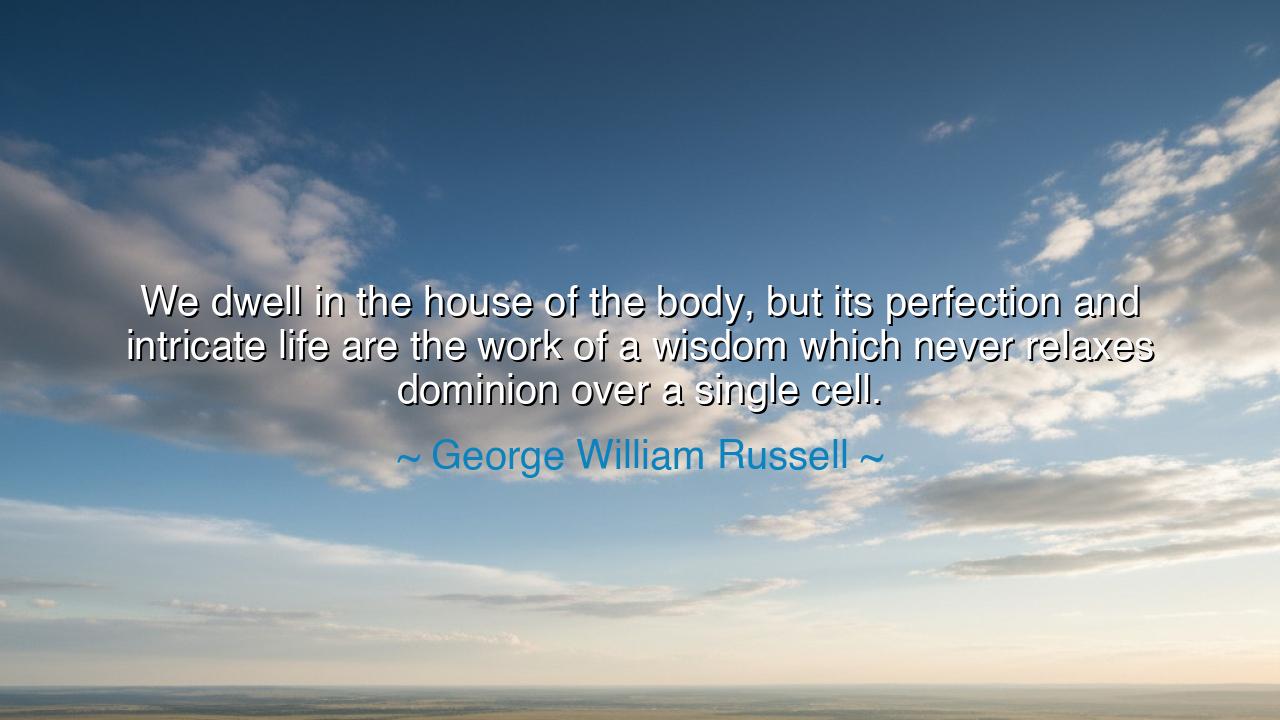
We dwell in the house of the body, but its perfection and
We dwell in the house of the body, but its perfection and intricate life are the work of a wisdom which never relaxes dominion over a single cell.






The mystic George William Russell, known also as Æ, unveiled a vision both poetic and eternal when he declared: “We dwell in the house of the body, but its perfection and intricate life are the work of a wisdom which never relaxes dominion over a single cell.” In this saying, he reminds us that the human body is not a random heap of clay, but a sacred house, woven together by an invisible wisdom that labors without rest. Every breath, every beat, every hidden motion within us speaks of a dominion older than thought, older than man himself.
The origin of this truth lies in the mystical and poetic reflections of Russell, who sought to see not only the material world but the divine flame that animates it. In an age when science was unveiling the microscopic and the cosmic alike, he perceived in both the hand of an eternal intelligence, guiding the growth of leaf and star, cell and soul. To him, the body was a temple, its countless cells servants of a higher harmony, each carrying within itself the music of order.
History bears witness to this reverence in the story of Hippocrates, the father of medicine. He taught that the physician’s task was not merely to fight disease, but to honor the natural wisdom within the body, which strives ceaselessly for balance and healing. His oath, still remembered, stands as testimony to the truth that health is not a conquest of man alone, but a partnership with the intricate order already written into the flesh. Thus Russell’s words echo the wisdom of the ancients: the body is guided from within by forces deeper than reason.
The ancients often called this power logos or divine reason, the hidden order binding chaos into form. Just as the universe is held together by unseen law, so too the body is governed by an intelligence beyond our command. We do not order our hearts to beat, nor our wounds to knit, yet they obey the silent dominion of this wisdom that never sleeps. The true sage bows in awe before this mystery, knowing that to live is to be carried by powers too subtle and too great for human hands.
Therefore, O seekers, regard your body not as a prison of the soul, but as a dwelling crafted by eternal wisdom. Care for it as you would a temple, honor its hidden labor, and marvel at its ceaseless harmony. For within you moves a power that governs every cell, a dominion unbroken, a vigilance unrelenting. To remember this is to walk humbly, gratefully, and joyfully in the mystery of life, knowing that even in silence, you are sustained by a wisdom that never fails.






TAThu Anh
This quote by George William Russell strikes me as a reminder of how much we are interconnected with the wisdom of nature and the universe. The idea that every cell is under the dominion of wisdom is awe-inspiring, but also a little intimidating. If such wisdom exists, why do we sometimes feel so disconnected from it in moments of illness or dis-ease? How can we better align ourselves with this wisdom to promote healing and well-being?
LNLy Nguyet
I really appreciate how this quote emphasizes the idea that wisdom governs not just the grand, visible aspects of life but the tiny, unseen cells that make up our bodies. It makes me think about how modern science uncovers more and more about the body’s inner workings, but will we ever fully understand the ‘wisdom’ that governs it all? Do we need to understand everything, or is it enough to trust the process and care for our bodies accordingly?
SHThanh Son Hoang
George William Russell’s reflection on the body being governed by a persistent, unrelenting wisdom raises the idea of how much control we really have over our health. If the body is so intricately designed by this wisdom, does that mean we’re often fighting against it when we try to manipulate or alter our bodies? How can we align ourselves more with this wisdom, and what would that look like in terms of living more mindfully and healthfully?
TDThao Dang
The concept of our bodies being a ‘house’ and the perfection of it being controlled by an unrelenting wisdom is intriguing. It makes me wonder: if this wisdom is so intricate, how does it translate into our health and well-being? Are there moments when we lose touch with this wisdom due to stress, illness, or lifestyle? How do we reconnect with this deeper, inherent wisdom in our bodies to live more healthfully?
TNThi Thuong Nguyen
Russell’s quote makes me reflect on how intricate and amazing our bodies are, and how little we often appreciate the wisdom that governs our daily functions. We tend to take our bodies for granted, but when you think of the wisdom guiding every cell, it’s almost miraculous. I’m curious though—do we really understand this wisdom, or is it beyond our comprehension? Can modern science fully grasp the complexity of the body’s systems?